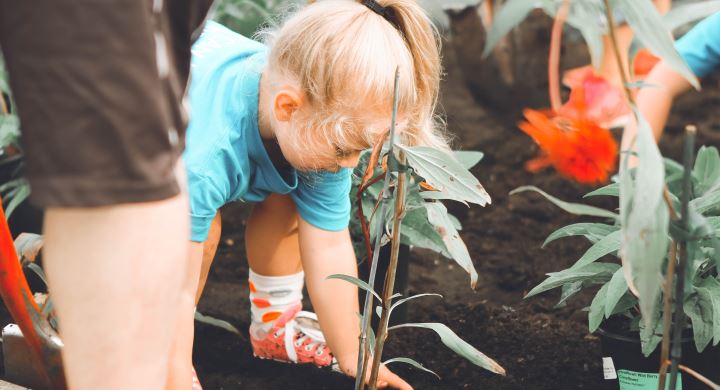During this time of global pandemic, and with everyone on lockdown, Christian parents are being presented with new opportunities they may not have had before to teach and homeschool their children in line with Biblical values. But if you’ve never had to homeschool before, it’s hard to know where to start.
We’ve asked two more experts on education, both of whom pastor in their church and at home, how parents can best take advantage of these times. We’ve also provided you with a few more resources below to help you keep going.
You can find more resources on Top tips from the experts for homeschooling during corona.
Spending quality time with the children at home
Lucy Barr-Hamilton is married to Nick, a vicar in the North East of England. Together they home educate their two children, 10 and 8.
What has been your experience with Christian education?
Before we had children, we knew Christian adults who had been home educated, and families who had chosen to teach their children at home for various reasons. We became convinced that if we had children, we would prefer to spend time with them at home, rather than them spending many hours a day with other people.
But the concept of explicitly Christian education has been a really slow-growing idea as we have home educated and seen the difference between the input from schools and our life at home. This, along with various Christian educational podcasts and books has taught me that an education can only be as full as possible if God is the unifying principle of all we do. All knowledge and truth and beauty in creation is fully realised by studying and knowing it as it relates to him first and foremost. This is something that educators of the past knew, but it has been forgotten and deliberately suppressed so that education of our children has become utilitarian and directed away from knowledge of the Lord and His creation.
What opportunities for Christian education does this time bring?
I hope that Christian families will see the joy and delight of having their children under their wings all the time, and perhaps look more deeply into the philosophy underlying school education and yearn for something different.
What have been the biggest challenges of home educating from your experience?
It is hard to keep going! The voices outside cry out that our children are improperly socialised when they are at home, and that a Christian education focused on truth and beauty will be useless in the real world. Doubts arise that we are not doing the right thing for their future. Added to this is the self-discipline required to consistently stick to the timetable you need to set for yourself. Compounding it all is the constant presence of your children and the 24-hour responsibility to raise them without any input from an institution acting in loco parentis. The world loudly says that I need “me time”, or that I must find my identity apart from being a mother, and it is tempting to believe this lie. But despite all this, it is worth it!
What’s the top piece of advice you’d give to parents who are just starting to home educate?
I would advise not going gung-ho into buying any materials, and not thinking that home education needs to look like school education or that you need to involve yourself with the national curriculum. Take your time, find a home educating friend you trust and spend time with them.
We have been immensely helped by the writings of a lady called Charlotte Mason, who was a Victorian educator who wrote down a philosophy of education with God at the top. Her work was hugely influential in her own day but was gradually forgotten over the twentieth century as secularisation came to pass. Praise God that Christians rediscovered and republished her work in the 1980s and slowly has re-spread over the whole world. I would strongly advise reading her work as it has transformed our education and home life.
Are there any online resources that you would recommend parents use?
You can read Charlotte Mason’s philosophy free online. I would recommend starting with volume 6!
If you would prefer a modern paraphrase I highly recommend a Kindle Book by Karen Glass, called Mind to Mind.
The series of podcasts which changed the way I thought about education is run by a group of American ladies, called the Schole Sisters – they’re well worth a listen.
Can you suggest one specific lesson or activity that parents could use with their children today?
Go outdoors and go for a walk if you are able. Just make a mental note of all that you see, both plants and animals. When you get home, try to make a list of all you’ve seen, and give thanks to God for the boundless variety and beauty out there.

Education doesn’t just happen in the classroom
Laura Harman co-pastors City Life Church, Portsmouth, with her husband Daniel. They have been home educators for the past four years, using Christian curricula. “We love the freedom it gives us to be able to integrate our beliefs into our children’s education,” she says.
What opportunities for Christian education does this time bring?
I think this time will allow many families to see the gift of giving your children a Christian education and many families will carry on doing this even after schools reopen.
What have been the biggest challenges of home education, from your experience?
For us, finding a good curriculum here in the UK has been the biggest struggle – we’ve found that most good curricula are American, and shipping can be expensive.
What’s the top piece of advice you’d give to parents who are starting to home educate?
Education happens in every area of a child’s life and the classroom isn’t the only place a child learns. Be open to learning opportunities all day long and just enjoy this time you get to impart life lessons into your children.
Are there any online resources that you would recommend?
Good and Beautiful is an American curriculum for children aged 5 to 18 and has a great Language Arts programme.
My Father’s World is another American curriculum which combines Charlotte Mason’s ideas with a Biblical worldview and more global focus.
Can you suggest one specific lesson or activity that parents could do with their children today?
Study the main countries at the moment that are having outbreaks of the virus. Use it as a geography lesson but also integrate prayer into the lesson. How can we pray for the country (other than the virus)? Put up a world map as a visual.
Adapting to your child’s needs is most important
Deborah Hartup has been homeschooling her two daughters for 10 years in Hertfordshire. She and her husband also run and oversee and IT firm. She says that they have found it most helpful to adapt their teaching as their children grow and develop, tailoring their education to their children’s needs.
What has been your experience with home education?
We have done a mish mash of different curricula that have suited us and sparked our interest. It has been a constantly changing experience because as the children grow, you have to continually adapt. It has been both hugely rewarding, but also physically, emotionally, and mentally demanding. Ultimately though, it is the closest thing we have to discipleship in our culture.
What opportunities for home education does this time bring?
It is difficult to compare exactly what is going on today – which is maybe more ‘school at home’ – to what homeschooling normally looks like. Home education is about teaching the whole heart of the child.
Ultimately, in these couple of months where the subjects are ticking over, what is important now is for children to learn from you by watching you. The biggest benefit now is for children to see their parents model Christian living. Often, mothers have their quiet Bible study time when the children are at school, so now is an amazing time to include your children in that.
If you are stressed, include your children as you take it to the Lord in prayer. You can work together as a team, whether it is the cooking or cleaning. This is an opportunity for your children to see how the household is run. Often it isn’t exactly the focused time of teaching, but it is the modelling to them. I would also add, many children are confused now that the exams are cancelled, so this is an opportunity to highlight that we are always learning, and that exams don’t define us. We can have a continual love of learning and not need to be tested.
What have been the biggest challenges of home educating, for your experience?
As I mentioned, the constant changing in the home as they grow has been a challenge. But also, home educating exposes your weaknesses, you can’t hide them, therefore it forces you to deal with your own issues. … And time management!
What’s the top piece of advice you’d give to parents who are starting to home educate?
Be kind to yourself and to your kids. A smaller amount of time with focused, enjoyable study is going to be worth ten times more than slogging away at something no one is enjoying. You want them to look back with fond memories. Also, do not compare it with the amount of time they are at school. Don’t think you are going to have them at a desk from 9am-3pm. Have fun with it. Get them to teach you!
Are there any online resources that you would recommend parents use?
There are plenty of history documentaries available online on YouTube.
Khan Academy has free resources and daily schedules for students aged 2-18 to keep them occupied.
Reading eggs (younger primary age children) makes learning to read interesting and engaging with online games and activities.
Math Seeds (primary age children) is a great way to make learning maths fun!
Brave Writer has free lessons plans on writing for during the lockdown.
Brain Pop is also free to use while the lockdown is on and has online interactive lessons on a variety of subjects.
Can you suggest one specific lesson or activity that parents could use with their children today?
We made a make-shift greenhouse out of wood and polythene in the garden. With that we have used it as an opportunity to do some gardening and composting and plant some seeds. We have been able to learn about things like photosynthesis, root systems, plant reproduction, and about growing your own vegetables.
Another thins we do most mornings is FaceTime the girls’ grandma, and they take turns to read Narnia to each other. It is nice for self-isolating older people and great for reading aloud which is one of the best activities for primary kids.

More resources
If you’re struggling amid the current situation, being stuck at home 24/7, perhaps having to work from home and somehow keep the children entertained, we recommend taking 7 minutes to read this article from Lovewise, on how we can survive this period and grow in our walk with God.
You can also find more materials and resources on Family Education Trust, which publishes books, factsheets and leaflets on a broad range of family-related issues, and produces educational materials and online resources usually for use in schools that highlight a Christian perspective of marriage and family.

